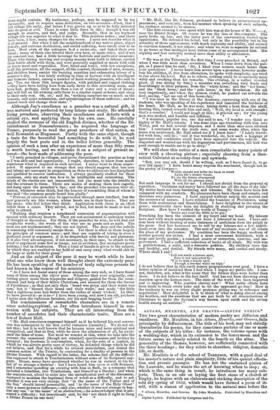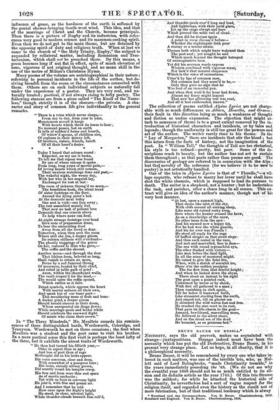ALTARS, HEARTHS, AND GRAVES—ALPINE LYRICS. * THE two great characteristics of
modern poetry are diffusion and smallness. Mr. Moultrie, in his Altars, Hearths, and Graves, fails principally by diffusiveness. The title of his book may not strictly characterize his poems, for they sometimes partake of one or more of the subjects of his titles : for instance, the volume opens with a wedding-day, whioh in its extension to the honeymoon and the future seems as closely related to the hearth as the altar. The generality of the themes, however, are sufficiently connected with the three headings ; for they relate to churches, religion, domestic life, or death.
Mr. Moultrie is of the school of Tennyson, with a good deal of his master's nature and plain simplicity, little of his quaint affecta- tion and prosaic passages. He has not the sustained pinion of the Laureate, and he wants the art of knowing when to stop ; or, which is the same thing in result, he introduces too many sub- jects. Thus, in an ode on laying the first stone of a church at Rugby, he begins with an elaborateand striking description of the cold dry spring of 1852, -which would have formed a poem of it- self, with a stanza of application to the natural man before the • Altars, Hearths, and Graves, By John Moultrie, Published by Hamilton and Co. Alpine Lyrics. Published by Longman and Co. influence of grace, as the hardness of the earth is softened by the genial shower-bringing South-west wind. This idea, and that of the marriage of Christ and the Church, become principals. Then there is a picture of Rugby and its industries, with refer- ences very good to modern science and its mammon-seeking spirit. Even then we do not get to the main theme, but are detained by the opposing spirit of duty and religious truth. When at last we come to the church of "the Holy Trinity, Rugby," the subject is expanded by collateral matter, including Romanism and Trac- tarianism, which shall. not be preached there. By this means, a poem becomes long if not fiat in effect, spite of much elevation of tone, vigorous if not original thought, and no mean skill in the use of the metre of Milton's Christmas Hymn. • Many poems of the volume are autobiographical in their nature; referring to personal incidents in the life of the author, but de- riving breadth from the scene or the circumstances connected with them. Others are on. such individual subjects as naturally fall under the experience of a pastor. They are very real, and na- turally, treated ; poetical, if not always rising to lofty poetry. The following stanzas are from a piece called "The Knell of the Name- less," though strictly it is of the obscure—the private. A cha- racter and story of conimon life give individuality to the general remarks
"There is a voice which never sleeps,— From day to day, from year to year, Monotonous accord it keeps With hearts which throb its tones to hear ; No moment passes, but on earth It tells of saddened home and hearth, Of widowed spouse, of childless sire, Of orphans in their misery left, Of brothers, sisters, friends, bereft Of all their heart's desire.
Today I heard that solemn sound :
• Expected, on my ear it broke, To tell me that repose was found
• By one of whose release it spoke
From long, long years of mortal pain,—
Of loving hearts which still remain,
Their-anxious watohings done and past,—
The wakeful night, the weary day, With her who in her anguish lay, Exchanged for rest at last :
The room of sickness thronged no more,—
The breathless hush, the silent tread Of sister footsteps on the floor, Around the dying sister's bed. d.
At the domestic meal today One seat is void—one face away ; The rest assembled mutely feel
That now no task of patient love
Demands that one remain above
To help where none can heal.
At night strange footsteps over head
Give note of preparation drear, To bear the unresisting dead Away from all she loved so dear. Tomorrow, when they seek the room Where still she lies, a deeper gloom Its solemn stillness will oeereloud- The ghastly trappings of the grave
On her, restored to Him who gave,—
The coffin and the shroud..
Another morn—and through the door That lifeless form, beloved so long, Shall vanish to return no more, Borne by a sad funereal throng Of mourners, headed by their chief, And robed in sable garb of grief : Anon, within the churchyard walls,
The vault reopen'd for the dead,—
The mould upon the coffin spread, Which rattles as it falls.
Dread symbols, which oppress the heart With mortal sadness all their own,
And speak but of our baser part—
This mouldering mass of flesh and hone: A darker grief, a deeper gloom Should herald sinners to their doom, Whom unrepented sin drags down ; While marriage-peals and bridal white Should celebrate the sunward flight Of saints who claim their crown."
In "The Three Minstrels," Mr. Moultrie records his reminis- cences of three distinguished bards, Wordsworth, Coleridge, and Tennyson. Wordsworth he met on three occasions ; the first when Moultrie was a student and the poet came to visit his brother. In a mere poetical sense this first visit is perhaps the least lofty of the three, but it exhibits the nicest traits of Wordsworth.
"He then had turned his fiftieth year,— Older in aspect than in age; And less of poet than of sage Methought did in his looks appear.
His voice sonorous, clear and deep, With somewhat of a pompous tone; His locks, already silvery grown, Did scantly round his temples creep.
His face and form were thin and spare As of ascetic anchorite'
Yet with us boys in converse light He joined, with free and genial air.
And I remember that he told How once upon the Right's height He stood, in clear, celestial light, While thunder-clouds beneath him rolled,
'And thundtk-yeals roared long and /WA, 4' '" "33 t And lightnings, with their lurid glare, ' fIgA odiz Lit up the crags abrupt and bare I.:4 1, g, 7. A 'cat Which pierced the sable veil of cloud. . t 1,t41w, And then did he diseuss again ,itt A point in verse discuss 41 before— Whether the nightingale doth pour ' Tfu A stormy or a tender strain.
Themes both which might have wakened the1s [in dor,
The poet soul ; yet nought he said - • -sky, ,y,f: Which much beyond the thought betrayed , rg,„ Of unimaginative men. , • - .1!I.7, Yet did his nervous words expressv,r, ,IL:1 Wisdom combined with vigorous sense, Nor lacked that natural eloquence Which is the voice of earnestness. 1' '11 -1 1 "
Uttered by lips of common men, ' • 'Ilt Not common had they seemed to be,— auu... - Only they gave no sign that he ,• Was lord of an immortal pen. - And when that wished-for hour had flown, Almost my fancy might lament That now her glittering veil was rent, ' -
And all it had enshrouded, known." -1
The collection of poems entitled Alpine Lyrics are not charge- able with so much diffuseness as Altars, Hearths, and Graves ; their fault in this direction being as much a weakness of thought and diction as undue expansion. The objection that might at- tach to sameness of theme is to a great extent removed by the in- troduction of historical characters and incidents, or by tales and legends; though the uniformity is still too great for the powers and art of the author. The writer rarely rises to his theme. In the "Lay of Morgarten," there are incidents that stir the blood ; but this arises from the facts of history, not the imagination of the poet. In" William Tell," the thoughts of Tell are too rhetorical, his style is too refined—pretty, but poor. Some of the de- scriptions reach to beauty, but the author has not art to sustain them throughout ; so that parts rather than poems are good. The discoveries of geology are referred to in connexion with the Alps; but they novelty of the reference (for we believe it to be new to poetry) is not artistically bandied.
One of the tales in Alpine Lyrics is that of " Florelle,"—a til- lage coquette, who refuses to marry her lover until he shall have shot the white chamois, which is supposed to lead its pursuer to death. The suitor is a shepherd, not a hunter ; but he undertakes the task, and perishes, after a chace long in all senses. This ex- tract will give an idea of the author's manner, though not of his very best manner.
"At last, upon a summit high, , That shone like islet of the sky, '
With cliffs around all sinking steep, r
Like apple old ruined rocky keep, _ Save where the hunter crossed the brow, As on a drawbridge of the snow, No other issue from the spot-: • And his seemed now a happy lot, . For he had won the white gazelle, And his for ever was Florelle He stood all ready for the rage Of baffled aleieht on that strait stars:
y'11.1
'
And thus each rested in the race, ' ;cf
And met and marvelled, face to face— !, ;3 al?.
The one with round reproachful eye,
The other flushed with.victory- Like men before the final fight, In all the sense of mustered might.
Ile raised to give the fatal fire, 1-145 454171 f When, witha shriek of scornful ire, :-..fn.10-D ar11 Sheer o'er the sudden precipice The foe flew from that fearful height ; And when he looked down the abyss, There
goat upon a pointed rock, • u ere stood an instant to his sight Unharmed by terror or by shock,
With feet all gathered to a span ; -3131) Then vanishing in cleft again, . a /k Till far below it burrowed forth,
Like streamlet starting from the earth,
And stayed not, till on glacier sea 1,2s It skimmed the wild waves fast and free.;,
He He crushed the star-wort to its root, 3nc
That gave its life,chann to tlie goat-- , rilfq Amazed, bewildered, marvelling more, 3,,7fx
Ile followed to the silent shore, And on the dread sea of the dead Ile bounded, as on primrose bed." : Jul

























 Previous page
Previous page